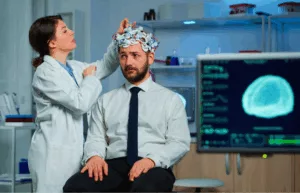The rare prion-linked neurodegenerative disease known as Gerstmann-Sträussler-Scheinker (GSS) disease is caused by inherited mutations in the PRNP gene, most notably the P102L alteration. The normal brain prion protein misfolds into the toxic form PrPSc as a result of this mutation, clumping together and destroying nerve cells. Although the genetic blueprint can be found in entire families due to its inherited nature, patients are usually diagnosed in their 40s or 50s.

The first symptoms, which include slurred speech, poor balance, and mild staggering, are subtle and simple to miss. Consider a finely tuned orchestra that gradually loses rhythm; early errors could be written off as stress or exhaustion. However, over the course of months, what initially appears to be clumsiness turns into persistent ataxia, which makes even seemingly simple movements like walking feel risky and unstable.
Patient & Disease Overview
| Attribute | Details |
|---|---|
| Disease Name | Gerstmann-Sträussler-Scheinker (GSS) disease |
| Gene Mutation | PRNP gene mutation, most often P102L substitution |
| Protein Involved | Misfolded prion protein (PrPSc) |
| Onset Age | Typically 40s to 50s |
| Early Symptoms | Unsteadiness of gait, clumsiness, mild speech difficulty |
| Progressive Symptoms | Worsening coordination, dementia, memory loss, visual disturbances |
| Diagnosis Method | Genetic testing, neurological exam, brain imaging |
| Treatment | Symptom management only; no cure available |
| Typical Outcome | Progressive decline over 2–10 years; fatal in later stages |
| Reference |
The course of cognitive decline is blunt. As speech becomes strained and memory deteriorates, dementia sets in. People who are impacted might have trouble speaking or forget commonplace information. Families frequently talk about a loved one’s “shrinking presence,” initially observing minor personality changes and then more severe losses until the loved one seems like a faraway version of themselves.
Uncertainty then exacerbates the emotional strain. The onset and severity of symptoms can differ significantly, even within a family. The timelines of two siblings with the same mutation may differ greatly; one may decline slowly, while the other may decline quickly. Prognoses and emotional readiness are complicated by this discrepancy.
Genetic screening plays a major role in diagnosis. A straightforward and early route is provided by blood tests that detect PRNP mutations. In contrast to the spongiform alterations of Creutzfeldt-Jakob disease, signature features such as Kuru-type amyloid plaques—dense prion aggregates—can be found through invasive spinal fluid analysis or brain biopsies. These different formations highlight the pathological differences between GSS and CJD, even though they both involve prion activity.
Unfortunately, there isn’t a treatment that can stop or reverse the progression. The goal of current care is symptom management, which includes providing supportive therapies like speech and physical rehabilitation as well as medication for tremors, anxiety, or seizures. Palliative care, mobility assistance, and feeding tubes are frequently used as the illness progresses. Families stress that even as physical decline persists, quality of life can be improved with careful attention.
Research gives cautious optimism. Treatments such as PRN100, a monoclonal antibody designed to eliminate PrPSc, are being investigated. Such therapies, which are still in the experimental stage, have a concept that is remarkably similar to Alzheimer’s beta-amyloid targeting and may eventually reduce prion accumulation. These innovative methods highlight how strategies for more common neurodegenerative diseases can be uncovered by studying rare diseases.
The prognosis averages about five years after diagnosis and varies from two to ten years. Because muscle deterioration makes breathing and swallowing difficult, respiratory complications like pneumonia frequently result in death. Like gardeners who watch a beloved plant wither in spite of their best efforts, caregivers are placed in depressing roles. Support groups like RareConnect and the Prion Alliance have grown in importance because they provide a safe haven for exchanging knowledge and experiences as well as emotional support.
Beyond its rarity, increasing awareness of GSS has significant societal value. Human stories, such as a former athlete whose coordination failed on the court or a 48-year-old schoolteacher who started missing steps in the hallway, increase awareness and empathy. Funding for Alzheimer’s and Huntington’s disease research has already changed as a result of public advocacy. Will GSS follow? Promising treatments might surface with more focus and funding.
Genetic counseling also becomes an important tool. A 50% chance of inheritance exists for those who have a first-degree relative with a diagnosis. Through counseling, people can make well-informed decisions about early testing, long-term care, and family planning. It turns fear into action.
Prion research provides a distinct scientific perspective on a broader scale. Many degenerative diseases are caused by misfolded proteins. GSS focuses on the processes that are essential to a larger endeavor to comprehend brain aging and degeneration, such as protein misfolding, aggregation, and cell death. Improvements in one prion disease frequently have a knock-on effect, which could speed up treatments in several different areas.
Rare diseases can be reframed as frontiers of discovery when GSS is shared narratively, with scientific accuracy and poignant human context. Lessons about community, resiliency, and the pressing need for medical advancement can be learned from each patient’s journey. Advocacy is a mission and a tribute for the impacted families, who do it not only for their departed loved ones but also for future generations.
In a hopeful future, GSS might be treated as a manageable illness instead of a death sentence thanks to technologies like supportive technologies, antibody therapies, and genetic screening. Even though the focus of current treatment is symptom control, ongoing research and public involvement indicate that a tipping point might be imminent. GSS can benefit from more focus, cooperation, and funding, just as other once-terminal diagnoses have gradually become survivable.
